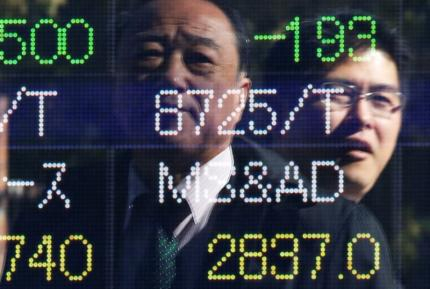Volatility rippled across European and Asian equity markets after turmoil surrounding Donald Trump's administration sparked the worst day in eight months for U.S. stocks. The dollar rebounded while gold slipped as a rush to haven assets subsided.
Stocks in Tokyo and Sydney paced declines after the S&P 500 Index plummeted by the most since September. Other assets showed more calm after Wednesday's sharp moves, even as a political crisis in Brazil added to the chaos in Washington. U.S. equity futures rose while the dollar benefited from weakness in the yen and emerging-market currencies. Treasury yields rose after dropping to a one-month low amid reduced bets for higher U.S. rates next month.
"The market has come alive with the dynamic of volatility, which will no doubt be welcomed by many of the shorter-term traders out there," Chris Weston, chief market strategist at IG Markets Ltd. in Melbourne wrote in note. "When so many global markets were at multi-year, if not all-time highs, you know there would be some pain being felt out on the floors today."
A gauge of U.S. stock volatility surged the most since the U.K. voted to leave the European Union last June, as the turmoil surrounding Trump threatens to derail the policy agenda that helped push global equities to records as recently as Tuesday. Many of the trades sparked by the president's shock November election have reversed, with the dollar all but erasing its post-election rally.
The administration is facing scrutiny about whether the president asked the former head of the FBI to drop an investigation, as well as questions about his handling of secret intelligence. The dollar saw some respite Thursday after former FBI Director Robert Mueller was appointed as special counsel to investigate Russian efforts to influence the 2016 election. Investors remain cautious as Brazil also plunged into crisis, following reports that President Michel Temer was involved in an alleged cover-up with the jailed former speaker of the lower house of Congress.
The political wranglings come amid increasing concern about the pace of the global economy, after weaker-than-expected readings on U.S. inflation and GDP. Data on Thursday showed Japan's economy expanded at a faster pace than forecast in the latest quarter, while Australia's jobless rate unexpectedly dropped.
"The important thing is what's going on with the economy," said Hideyuki Suzuki, a general manager at SBI Securities Co. in Tokyo. "It's not just the political anxiety, but this coming on top of some U.S. data that have shown soft numbers, lowering the odds of a rate hike."












